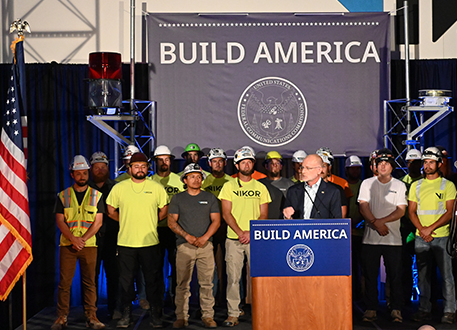FCC Chair Carr Lays Out Infrastructure Policy Agenda
‘Build America Agenda’ event in South Dakota was his first major policy speech

The professional video industry's #1 source for news, trends and product and tech information. Sign up below.
You are now subscribed
Your newsletter sign-up was successful
SIOUX FALLS, S.D.—In his first major policy speech, Federal Communications Commission chair Brendan Carr outlined his “Build America Agenda” for the agency’s principal infrastructure policies.
In the speech, Carr emphasized plans to encourage and speed up the process of building high-speed infrastructure, the need to free up more spectrum for the wireless industry, efforts to boost America’s space economy, his deregulatory agenda of cutting red tape, efforts to further strengthen national security by maintaining security and resilient networks and FCC policies that will “ensure that tower and telecom crews can operate in a safe and sustainable environment with rising wages,” Carr said.
“It is time to unleash new growth and opportunity,” he said. “It is time to build. Through the FCC’s Build America Agenda, we will do exactly that.”
Carr gave the speech at a training facility for tower workers in South Dakota.
“I first visited this Training Center seven years ago when you held a ribbon-cutting ceremony,” he said. “That was also the first time in this job that I ever put on a harness and hard hat, blatantly violated the Dukakis rule that governs public officials and helmets, and climbed the practice tower in the parking lot out back with Brandon—your director of safety and field operations. I was admittedly a little shaky on that first climb. And it certainly didn’t help when the other climber we were with, Leland, started trying to shake the platform up top.”
In the speech, which was focused on network infrastructure, wireless, spectrum and the space economy, Carr did not directly discuss broadcasting, the transition to ATSC 3.0 or ownership caps, though he did emphasize the FCC’s deregulatory agenda.
Key highlights and quotes from the speech include:
The professional video industry's #1 source for news, trends and product and tech information. Sign up below.
- Unleashing High-Speed Infrastructure Builds. “The FCC must do its part to unleash high-speed infrastructure builds in communities all across the country. We made a lot of good progress on this front during President Trump’s first term but there is more work to be done to cut red tape that is driving up costs and holding back Internet builds,” Carr said.
- Restoring America’s Leadership in Wireless. “We also need to free up more spectrum that connects our communities and restore America’s wireless leadership,” Carr said. “This is an important step because freeing up spectrum creates jobs, increases competition and drives down prices for consumers.”
- Boosting America’s Space Economy. “From the high-speed Internet services they are offering to protecting the homeland, our space industry is delivering real results for the country. We must ensure that U.S. businesses dominate in orbit,” Carr said.
- Cutting Red Tape and Modernizing FCC Operations. “Outdated and unnecessary regulations from Washington can derail efforts to bring communities across the digital divide,” Carr said. “That is why our Build America Agenda includes a comprehensive initiative to eliminate rules and regulations that are unlawful, outdated, or no longer necessary.”
- Advancing National Security and Public Safety. “Our Build America Agenda will ensure the U.S. maintains secure and resilient networks. It will extend America’s leadership over China in the race for critical technologies like 5G, 6G and AI, so that American companies continue to be the gold standard around the world,” Carr said.
- Strengthening America’s Workforce. “We cannot advance a Build America Agenda without a strong U.S. workforce. That is why the FCC is already working to ensure that tower and telecom crews can operate in a safe and sustainable environment with rising wages. By looking out for the American worker, we will see continued growth ahead,” Carr said.
The full speech is available here.
George Winslow is the senior content producer for TV Tech. He has written about the television, media and technology industries for nearly 30 years for such publications as Broadcasting & Cable, Multichannel News and TV Tech. Over the years, he has edited a number of magazines, including Multichannel News International and World Screen, and moderated panels at such major industry events as NAB and MIP TV. He has published two books and dozens of encyclopedia articles on such subjects as the media, New York City history and economics.

